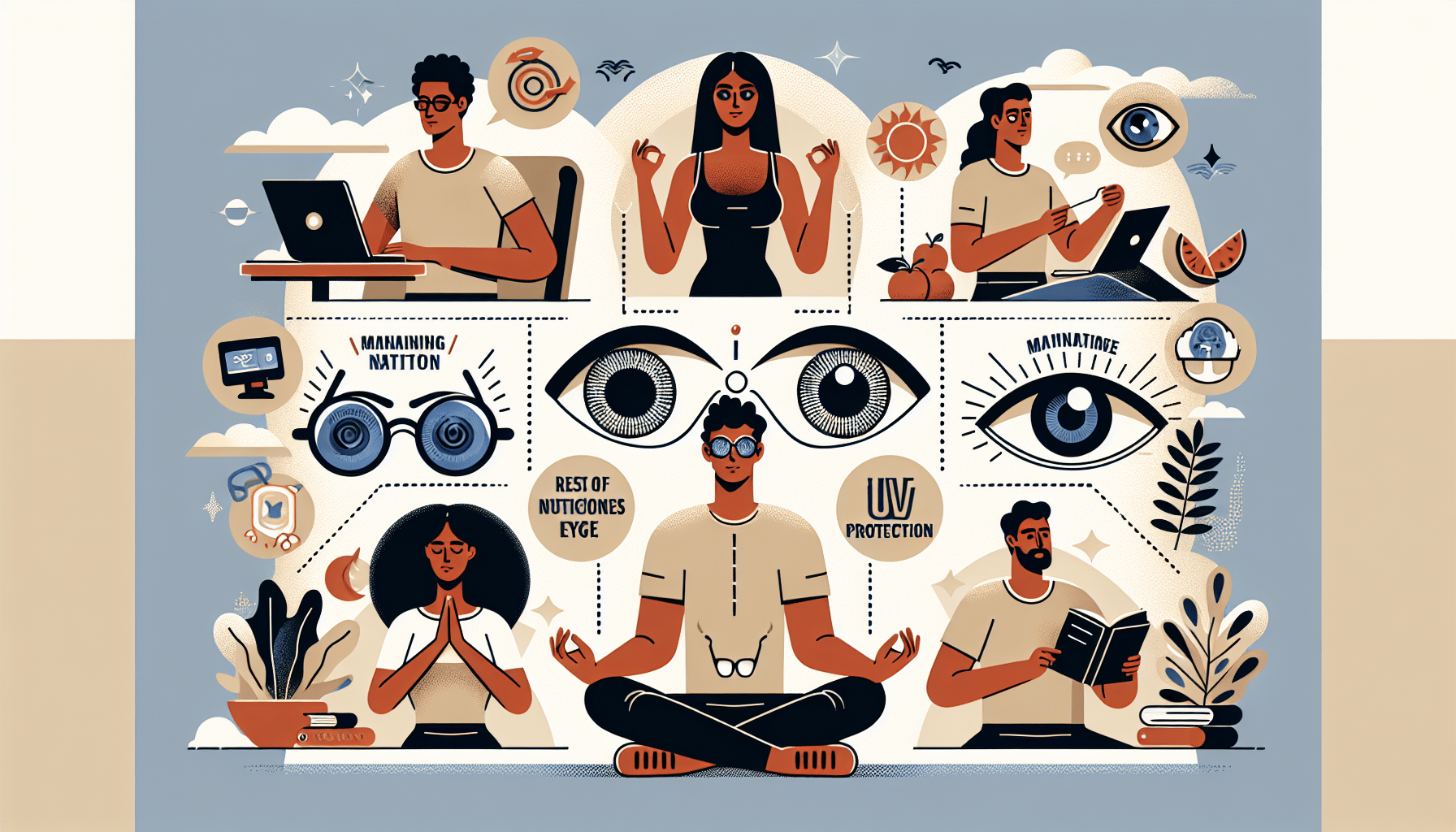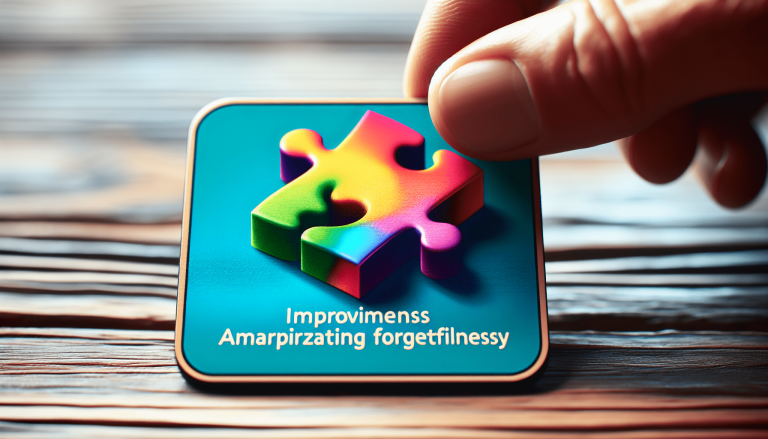What Are 6 Ways To Improve Your Vision?
Do you often find yourself squinting at signs or struggling to read small print? If so, you’re not alone. Many people experience vision difficulties, but the good news is that there are simple steps you can take to improve your vision naturally. In this article, we will explore six effective ways to enhance your eyesight and see the world with more clarity. Whether it’s adjusting your screen time habits or incorporating specific foods into your diet, these practical tips will help you on your journey to better vision. So, let’s get started and learn how to give your eyes the care and attention they deserve.

Eat a healthy diet
Maintaining a healthy diet is not only beneficial for your overall well-being but also plays a crucial role in improving your vision. By including foods that are rich in vitamins A, C, and E, you can provide your eyes with essential nutrients to promote good eye health.
Vitamin A is essential for maintaining good eyesight and promoting night vision. Foods such as carrots, sweet potatoes, and spinach are excellent sources of vitamin A. Additionally, vitamin C helps strengthen blood vessels in the eyes and can be found in citrus fruits, berries, and broccoli. Vitamin E, found in nuts, seeds, and leafy greens, acts as an antioxidant, protecting your eyes from damage caused by free radicals.
Incorporating foods high in antioxidants into your daily meals is another way to improve your vision. Antioxidants help counteract the damaging effects of harmful free radicals, which can contribute to age-related macular degeneration (AMD) and cataracts. Foods like blueberries, kale, and dark chocolate are rich in antioxidants and can significantly benefit your eye health.
Omega-3 fatty acids are essential for maintaining proper function of the eyes’ cell membranes. They can be found in fatty fish like salmon, trout, and sardines, as well as in chia seeds and flaxseeds. Including these foods in your diet can help reduce the risk of developing dry eyes and maintain overall eye health.
Lutein and zeaxanthin are two vital carotenoids that are present in the retina. They act as natural antioxidants, protecting the eyes from harmful light-induced damage. Consuming foods like spinach, kale, and eggs can increase the levels of lutein and zeaxanthin in your eyes, helping to maintain clear and sharp vision.
It is essential to avoid processed and sugary foods as they can lead to various health issues, including vision problems. High sugar intake can increase your risk of developing conditions such as diabetic retinopathy and cataracts. Opt for fresh fruits, vegetables, whole grains, and lean proteins to fuel your body and support your eye health.
Protect your eyes from harmful UV rays
Exposure to harmful ultraviolet (UV) rays can cause significant damage to your eyes and increase the risk of conditions such as cataracts and macular degeneration. It is crucial to take necessary precautions to protect your eyes when spending time outdoors.
Wearing sunglasses with 100% UV protection is an effective way to shield your eyes from harmful rays. Look for sunglasses that block both UVA and UVB rays to provide comprehensive protection. It is also recommended to opt for wrap-around styles or oversized frames to minimize the amount of UV rays that can reach your eyes from the sides.
Using a wide-brimmed hat or visor in conjunction with sunglasses can provide extra protection by creating a physical barrier between your eyes and the sun’s rays. By shading your face and eyes, you can significantly reduce the amount of UV radiation that reaches your eyes.
During peak sun hours, usually between 10 am and 4 pm, it is advisable to avoid direct sun exposure as much as possible. Seek shade or stay indoors during these hours when the sun’s rays are the strongest and most harmful to your eyes.
Applying sunscreen around your eyes is also important to protect the delicate skin from UV damage. Look for a sunscreen specifically formulated for the areas around the eyes, taking extra care not to get it in your eyes. By adding this extra layer of protection, you can further minimize the potential damage caused by UV radiation.
Give your eyes regular breaks
In today’s digital age, our eyes are continuously exposed to screens and other forms of electronic devices. It is crucial to give your eyes regular breaks to prevent eye strain and maintain healthy vision.
A popular rule to follow is the 20-20-20 rule. Every 20 minutes, take a 20-second break and focus your gaze on something at least 20 feet away. This exercise helps reduce eye fatigue and allows your eyes to relax by varying the distance they focus on.
Adjusting your screen and workstation ergonomics can also significantly improve your eye health. Position your screen slightly below eye level and about 20 to 28 inches away from your eyes. This adjustment minimizes the strain on your eye muscles and reduces the risk of developing computer vision syndrome.
Taking frequent breaks during screen time is essential to prevent eye strain. Get up, stretch, and move around every hour to give your eyes and body a much-needed break from prolonged sitting and near-vision tasks. Use this opportunity to focus on objects at various distances to stimulate your eye muscles and reduce fatigue.
Blinking regularly is a simple yet effective technique to prevent dry eyes. When we stare at screens or concentrate on a particular task, we tend to blink less frequently, leading to dry and irritated eyes. Reminding yourself to blink consciously can help keep your eyes moist and prevent discomfort.
Exercise your eyes
Just like any other muscle in your body, your eyes can benefit from regular exercise to improve focus and maintain healthy vision. Incorporating simple eye exercises into your daily routine can help strengthen your eye muscles, increase blood circulation, and reduce eye strain.
Performing eye exercises that involve focusing on objects at different distances is an excellent way to improve your eye’s ability to focus and adjust. For example, try looking at distant objects for a few seconds, then shift your gaze to something nearby. Repeat this exercise several times to stimulate your focusing muscles.
Eye yoga or palming is another technique that can relax your eyes and relieve tension. Gently rub your palms together to generate heat and cup them over your closed eyes. Allow the warmth and darkness to soothe your eyes for a few minutes. This practice can help relax your eye muscles and alleviate eye strain.
Using eye massage techniques can also promote healthy blood flow to your eyes and reduce eye fatigue. Gently press your index and middle fingers against your temples and massage in a circular motion for a few seconds. Gradually move your fingers to the area just below your eyes and continue the circular massage. This exercise can help relieve tension and improve circulation around your eyes.
Engaging in outdoor activities that require varying focus distances can help exercise your eyes naturally. When you spend time outside, your eyes adjust to different objects at different distances, stimulating your eye muscles and enhancing your ability to focus. Taking regular breaks from sedentary tasks and enjoying the benefits of outdoor activities can significantly contribute to maintaining good eye health.

Get regular eye check-ups
To ensure optimal eye health, it is essential to schedule regular visits to an eye care professional. Annual eye exams can help detect any potential issues early on and enable timely interventions to prevent further deterioration.
During a comprehensive eye exam, your eye care professional will evaluate your vision and check for any signs of eye diseases or conditions. They will also measure your eye pressure, examine the health of your retina, and assess the overall function of your eyes. Regular eye exams are especially important for individuals with a family history of eye diseases or those with existing eye conditions.
Monitoring changes in your vision is crucial to catch any abnormalities or deterioration promptly. If you notice any sudden or significant changes in your vision, such as blurry vision, double vision, or difficulty seeing at night, it is crucial to consult an eye care professional immediately. Timely intervention can often make a significant difference in preventing further damage and preserving your vision.
Addressing any eye-related concerns promptly is crucial for maintaining the health of your eyes. If you experience any discomfort, redness, irritation, or persistent dryness, make sure to seek professional advice. Ignoring or delaying the treatment of eye-related issues can have long-term consequences and may impact your vision quality.
Practice good eye hygiene
Maintaining good eye hygiene is essential to prevent infections and eye-related complications. By following some simple practices, you can keep your eyes healthy and reduce the risk of eye infections.
Washing your hands before touching your eyes is crucial to prevent the transfer of bacteria and viruses to your eyes. Frequent handwashing using soap and warm water for at least 20 seconds is highly recommended to minimize the risk of contamination.
Removing eye makeup properly is vital to avoid irritation and infections. Use a gentle eye makeup remover and cotton pads or a clean washcloth to wipe away makeup gently. Avoid rubbing or pulling at your eyelids, as this can cause damage to the delicate skin and potentially lead to eye problems.
Avoid rubbing your eyes, especially when they are itchy or irritated. Rubbing can introduce dirt, bacteria, or allergens into your eyes and increase the risk of infections or corneal scratches. If your eyes feel itchy, try using a clean, damp cloth or artificial tears to relieve the discomfort.
If you wear contact lenses, it is crucial to keep them clean and practice proper hygiene. Follow the instructions provided by your eye care professional or lens manufacturer for cleaning and storing your lenses. Avoid sleeping in your contacts or wearing them longer than recommended, as this can lead to eye infections and other complications.
By following these simple practices to maintain good eye hygiene, you can prevent potential eye infections and promote overall eye health. Taking care of your eyes is an important part of your daily routine and can significantly contribute to preserving your vision for years to come.
Incorporating these six ways to improve your vision into your daily routine can have a significant impact on your eye health and overall well-being. By eating a healthy diet, protecting your eyes from harmful UV rays, giving yourself regular breaks, exercising your eyes, getting regular eye check-ups, and practicing good eye hygiene, you can take proactive steps towards maintaining clear, sharp vision for a lifetime. Remember, your eyes are precious, and investing time and effort in caring for them today can ensure a brighter and clearer future.
Additional Resource

David Lewis, an Eye Specialist with 37 years of experience, has helped 110,000+ men and women achieve 20/20 vision. All these men and women, ranging from age 12 to 93, got 20/20 vision without any glasses, contacts, or surgery.
David Lewis has put together a short video for you where you’ll see how easy it is to “reset” your eyes completely naturally, so you can see better than an army sniper…
All you need to do is watch this short video presentation: https://bit.ly/macular-degeneration-treatment







